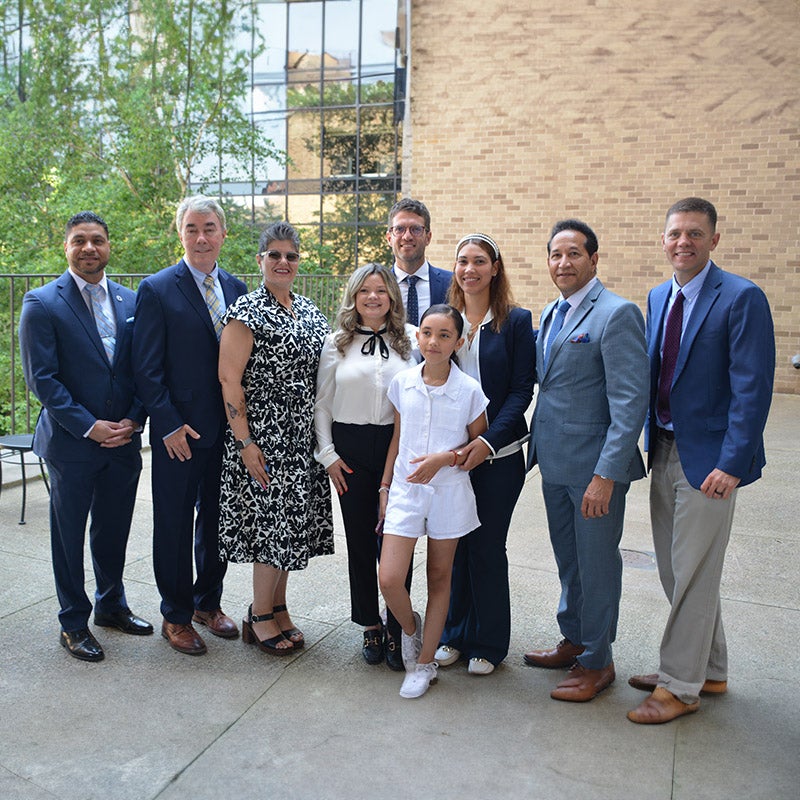Mercy Receives $1.1 Million Grant for Substance Use Disorder Services
June 11, 2024Categories: Events
The Massachusetts Department of Public Health, Bureau of Substance Addiction Services, has awarded Mercy Medical Center a grant totaling $1,171,322 million to support the hospital’s substance use disorder (SUD) consult services. The grant will fund SUD services through June of 2025. Mercy also has the option to renew the funding through June 2032, bringing the total grant amount close to $6.5 million for Mercy to support addiction treatment in the greater Springfield community. The funding will support Mercy’s efforts to ensure proper evaluation and nonjudgmental treatment to those who are experiencing medical complications of a substance use disorder in a hospital setting.

(left to right) State Representative Orlando Ramos; Dan Keenan, Regional Vice President Advocacy and Government Relations, Trinity Health Of New England; Maria Mead, Mercy Behavioral Health Clinical Supervisor; Edna Rodríguez, LP-PsyD, Mercy’s Director of Behavioral Health; Mercy President Dr. Robert Roose; State Representative Shirley Arriaga and her daughter; State Representative Carlos González; and State Senator John Velis.
In 2018, Mercy Medical Center established the hospital’s Addiction Consult Services (ACS), one of the first ACSs within a Massachusetts community hospital. The staff of Mercy’s ACS currently includes a Medical Director, Physician Assistant, an RN specially trained in substance use disorder, recovery coaches, and Behavioral Health Specialists (LICSW). The grant will provide sustainability and vibrancy for Mercy’s ACS while also allowing the program to expand. Specifically, the funding will allow the ACS to be available to patients six days a week, while also building out trainings to further empower each member of the workforce to provide culturally sensitive, trauma informed care, as well as train “champions” on the hospitalist and ER teams to initiate evidence-based addiction care after hours.
“Mercy’s Addiction Consult Services are a vital part of our Mission to serve as a transforming, healing presence because it attends to community need while supporting positive individual and population health outcomes and equity,” said Robert Roose, M.D., M.P.H., President, Mercy Medical Center and Johnson Memorial Hospital. “This exemplary model of care has been a life-saving service for patients with substance use disorders, and we are grateful to the Department of Public Health for the funding that will allow us to expand these efforts.”
Mercy’s ACS was first established six years ago and was initially staffed by a physician and a social worker. Since then, hospital leaders have championed the cause by seeking out grants that have allowed them to build out the team to include addiction medicine providers, behavioral health specialists, peer recovery coaches, and others. Mercy’s addiction consult providers currently provide care for approximately 800 patients per year, both in the hospital setting and in the community where they do post-overdose and harm reduction outreach. ACS providers also engage with community task forces that focus on addiction.
In implementing the grant, Mercy will work closely with clinical leadership, the hospital’s Healthcare for the Homeless program, the Community Health and Well Being department, and the psychiatric consult liaison to ensure that all aspects of the mental and emotional health are being addressed while the patient is in the hospital and immediately after discharge. The grant also requires the involvement of community partners, including Live Well Springfield, the Behavioral Health Network, Tapestry Health, and Gandara, that will support the patients post-discharge with ongoing assistance.
“The partnerships with these organizations are vital to the success of the Addiction Consult Services because they are also trusted by those we serve and they understand the specific challenges and resources available in the community,” said Edna Rodríguez, LP-PsyD, Director of Behavioral Health, Mercy Medical Center, who will oversee the funding. “We are eager to further efforts to help improve and expand access to care for those struggling with a substance use disorder, creating opportunities for harm-reduction and recovery.”
